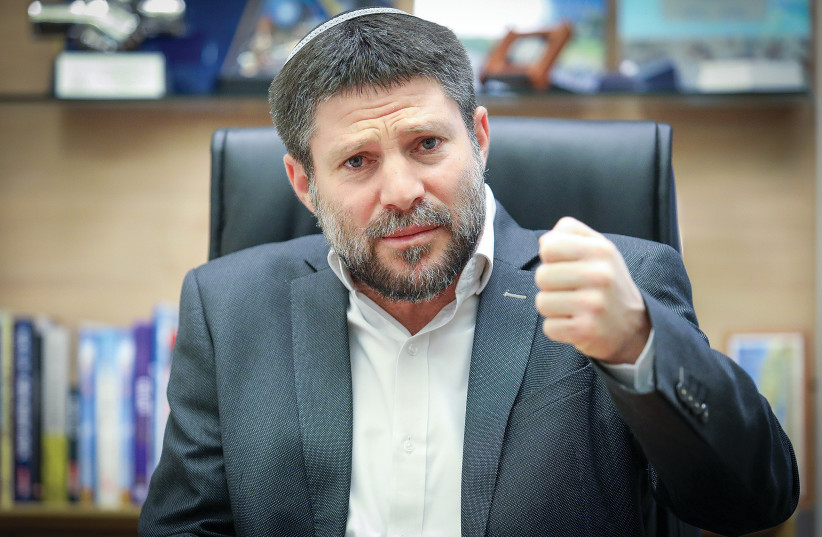Prime Minister Naftali Bennett’s use of the phrase “West Bank” on Sunday, instead of Judea and Samaria, set off a firestorm amid the Israeli Right, which is already upset over a de facto freeze in the advancement of plans for new settler homes.
“Our government is working very hard to improve the lives of the Palestinians in the West Bank and Gaza,” Bennett said on Sunday in a joint press conference with visiting US Secretary of State Antony Blinken.
Bennett’s office immediately put out a statement dismissing the significance of the linguistic shift.
“The prime minister usually uses the term “Judea and Samaria” in both Hebrew and English. No special significance should be attributed to his choice of language.”
The Right, however, attacked Bennett. MK Bezalel Smotrich, who heads the far-Right Religious Zionist Party, immediately attacked him for adopting the “Palestinian narrative.”

“Day by day it has become clear that Bennett and [Interior Minister Ayelet] Shaked [of the Yamina Party] have joined the Left not as a tactical move, but with the full adoption of its policies and even its left-wing terminology,” Smotrich said.
Bennett heads the right-wing party Yamina, which is opposed to the West Bank language, fearing it negates the Israeli connection to an area that is the biblical heartland of the Jewish people. Himself a former director-general of the Yesha Council, Bennett is very specific about the language he uses with respect to the Israeli-Palestinian conflict. He has disavowed Palestinian statehood, spoken consistently of Judea and Samaria and supported the application of Israeli sovereignty over Area C of the West Bank, which is under both IDF military and civilian rule.
Right-wing politicians in Israel and the settlement movement, however, prefer to speak of by its biblical names of Judea and Samaria.
The Israeli Right, including Bennett, believes that some if not all of Area C in the West Bank must be part of Israeli sovereign territory in the future; the Left and the Palestinians hold that most of this area, if not all of it, will be part of the final borders of a Palestinian state.
The United States, particularly the State Department, has historically used the phrase West Bank, save for during the former Trump administration. Former US secretary of state Mike Pompeo and former US ambassador David Friedman deliberately spoke of the area as Judea and Samaria to highlight Israel’s historical and religious ties to the region.
The new language was also part of a Trump administration policy shift on the West Bank, in which it rescinded a State Department legal option that West Bank settlements were illegal in favor of one that held that these Jewish communities in Judea and Samaria were not inconsistent with international law.
MANY ISRAELI politicians, including former prime minister Benjamin Netanyahu who heads the opposition Likud Party, as well as others in the Center and Center Right, do speak of the West Bank. Netanyahu, in particular, has used that language in international forums, including with American officials.
Bennett’s refusal to use that language is one of the ways he has traditionally stood to the right of Netanyahu. But his right-wing standing has been called into question by his opponents, who are furious over his decision to form a government with left-wing and Israeli-Arab parties.
Settler leaders, in particular, have accused Bennett and Defense Minister Benny Gantz of freezing the advancement of plans for new settlement homes. They held a protest in front of Bennett’s Jerusalem office on Monday morning and called for the government to fall.
In his press event with Bennett, Blinken spoke of the importance of halting settlement activity and called out settler violence.
Israelis and Palestinians have to work to prevent actions “that could raise tensions, including settlement expansion, settler violence, incitement to violence, demolitions, payments to individuals convicted of terrorism, evictions of families from homes they’ve lived in for decades,” Blinken said.
“It is clear that Secretary of State Blinken sets the tone for the conversations between the United States and Israel, and his statement significantly affects the internal discourse of the current Israeli government,” Efrat Council head Oded Revivi said.
“Blinken’s statement – that the settlers are violent and that Israeli construction should be prevented – is completely detached from reality on the ground, but is largely consistent with the narrative perpetuated by the radical anti-Israel elements in American progressive communities – the small, extreme, loud violent minorities,” he said.
“If the secretary of state is to be successful, he must come to view the reality on the ground,” Revivi said. “I sincerely hope that he takes me up on my invitation to host him in Efrat on his next visit to Israel.”
